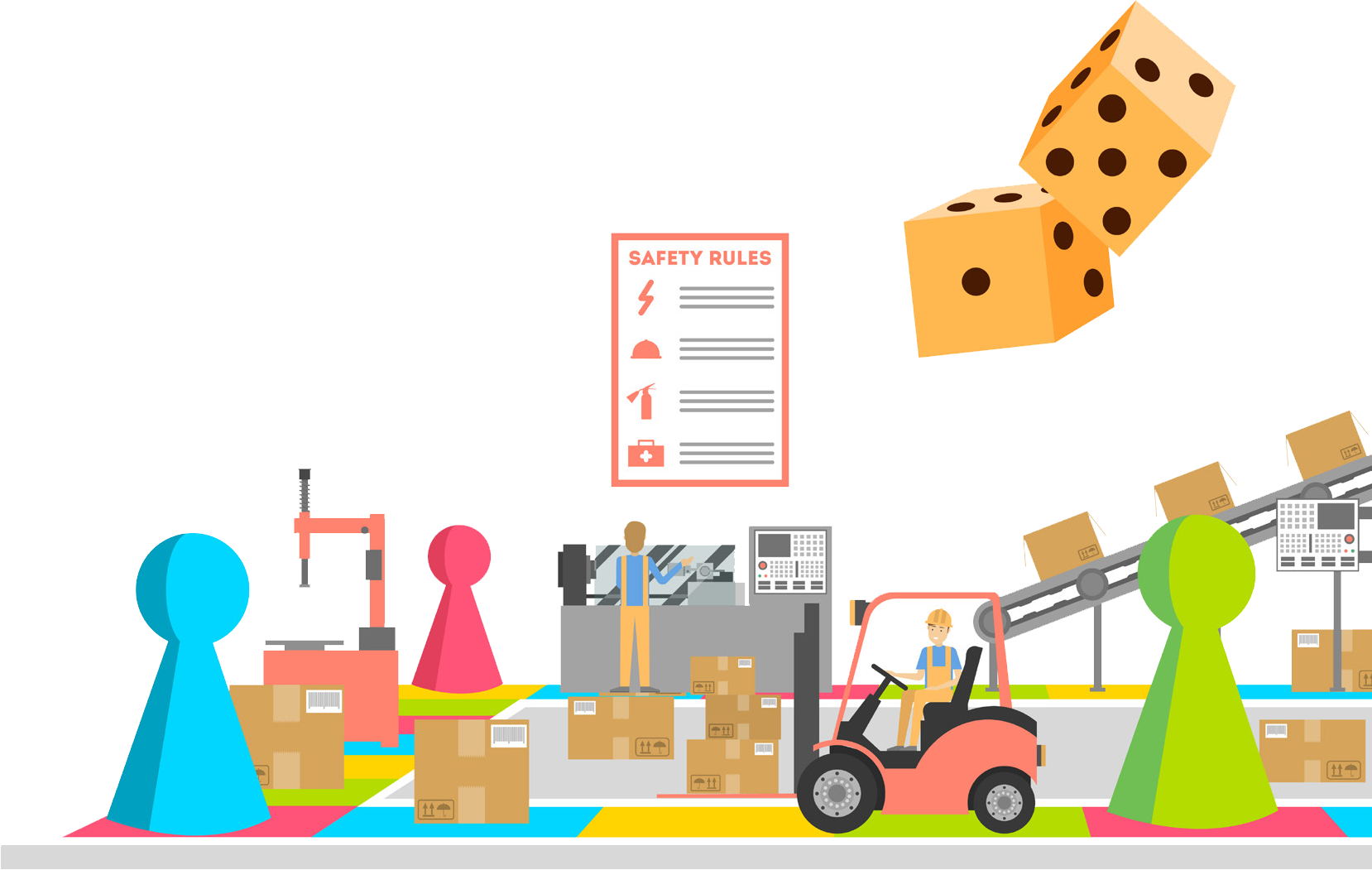The Role of Serious Games
IN INDUSTRIAL LEARNING

Serious games are games that have another purpose besides entertainment, serving to promote specific knowledge and behaviour change across diverse domains. They integrate engaging gameplay with learning strategies to effectively teach a combination of specific skills, knowledge, and attitudes. The approach is increasingly being adopted as valuable tools in manufacturing and industrial sectors, providing immersive experiences that contribute to enhance employee skills and operational efficiency. Serious games can cover topics ranging from real-world challenges, such as energy transitions, up to technical challenges such as factory planning.
Benefits to the Manufacturing Industry
The manufacturing industry stands to gain numerous benefits from integrating serious games into its training and learning processes. One of the primary advantages is the ability to simulate complex industrial environments and processes in a safe and controlled setting. Through boardgames and virtual simulations, employees can engage with intricate systems, equipment operation, and production workflows. A serious game allows them to practice skills and procedures without the risk of injury or damage to equipment by creating a feeling of safety where mistakes have no real-life repercussion.
Serious games offer a dynamic and interactive learning environment that caters to different learning styles and preferences. Through gamified simulations, employees can actively participate in their learning journey, receive feedback on their performance, and potentially track their progress over time.

This level of engagement can significantly enhance knowledge retention and skill development compared to traditional training methods. Moreover, serious games can facilitate collaborative learning experiences, enabling employees to work together to solve problems, make decisions, and achieve common goals. By fostering teamwork and communication skills, these games can help create a more cohesive and efficient workforce within manufacturing organisations.
Furthermore, serious games can be easily customised to address specific learning objectives and training needs within the manufacturing industry. Whether it’s training operators on new equipment, teaching maintenance procedures, or reinforcing safety protocols, these games offer a versatile and adaptable solution for targeted skill development.
Example of Success Stories
Several manufacturing companies have successfully implemented serious games as part of their training and learning initiatives, yielding tangible benefits in terms of employee performance and operational outcomes. One notable example comes from Siemens Gamesa, a leader in renewable energy. They employ a virtual serious game to train maintenance technicians by simulating scenarios for troubleshooting skills and equipment handling confidence. Collaborating with a design team, they developed a simulation program focusing on correct procedures for wind turbine lifts. The program employs a progressive learning approach, integrating seamlessly into the existing LMS (Learning management system) for easy updates and continual improvement¹.
Another company opting for serious games to train their employees is Royal BAM Group, an international construction company. They implemented a serious board game to train their employees on a new methodology to document their projects. During the game, participants develop a project for a fictional client following the current way of working, afterwards they create
the project under the new company approach. After project negotiations and restructured teams, participants can rapidly discover the benefits of a new approach and get acquainted with the new structure².
Challenges
Despite the numerous benefits, the adoption of serious games in the manufacturing industry is not without its challenges. For digital serious games, one major hurdle is the initial investment required for developing a high-quality platform tailored to specific industrial contexts. Developing realistic simulations that accurately replicate complex manufacturing environments and processes can be time-consuming and costly. Serious board games, that use tangible and printed components, require a lower initial investment. However, they also require a compromise on the fidelity of the complex system being represented in the game.
Another challenge is ensuring that serious games effectively address the unique learning needs and objectives of manufacturing employees. Designing games that strike the right balance between educational content and engaging gameplay requires careful planning and collaboration between learning experts, subject matter professionals and game designers.
Additionally, integrating serious games into existing training programs and workflows can pose logistical challenges for manufacturing organisations. From deploying the necessary hardware and software infrastructure to training instructors and employees on how to use the games effectively, there are various implementation hurdles that need to be overcome.
Moreover, measuring the effectiveness and ROI of serious games in terms of learning outcomes and performance improvements can be challenging. While traditional metrics such as completion rates and assessment scores provide some indication of success, evaluating the long-term impact of serious games on employee skills, productivity, and job performance requires more comprehensive evaluation frameworks and data analytics capabilities.
In conclusion, physical and digital serious games have the potential to revolutionise industrial learning and training in the manufacturing sector. By providing immersive, interactive, and tailored learning experiences, these games can help organisations develop a skilled and agile workforce capable of meeting the evolving challenges of modern manufacturing. However, overcoming the challenges associated with adoption and implementation will be crucial to realising the full potential of serious games in industrial learning.

1. https://www.seriousgames.net/en/portfolio/siemens-wind-power-safety-training-in-wind-turbines/
2. https://www.businessgames.com/projects/bam/
